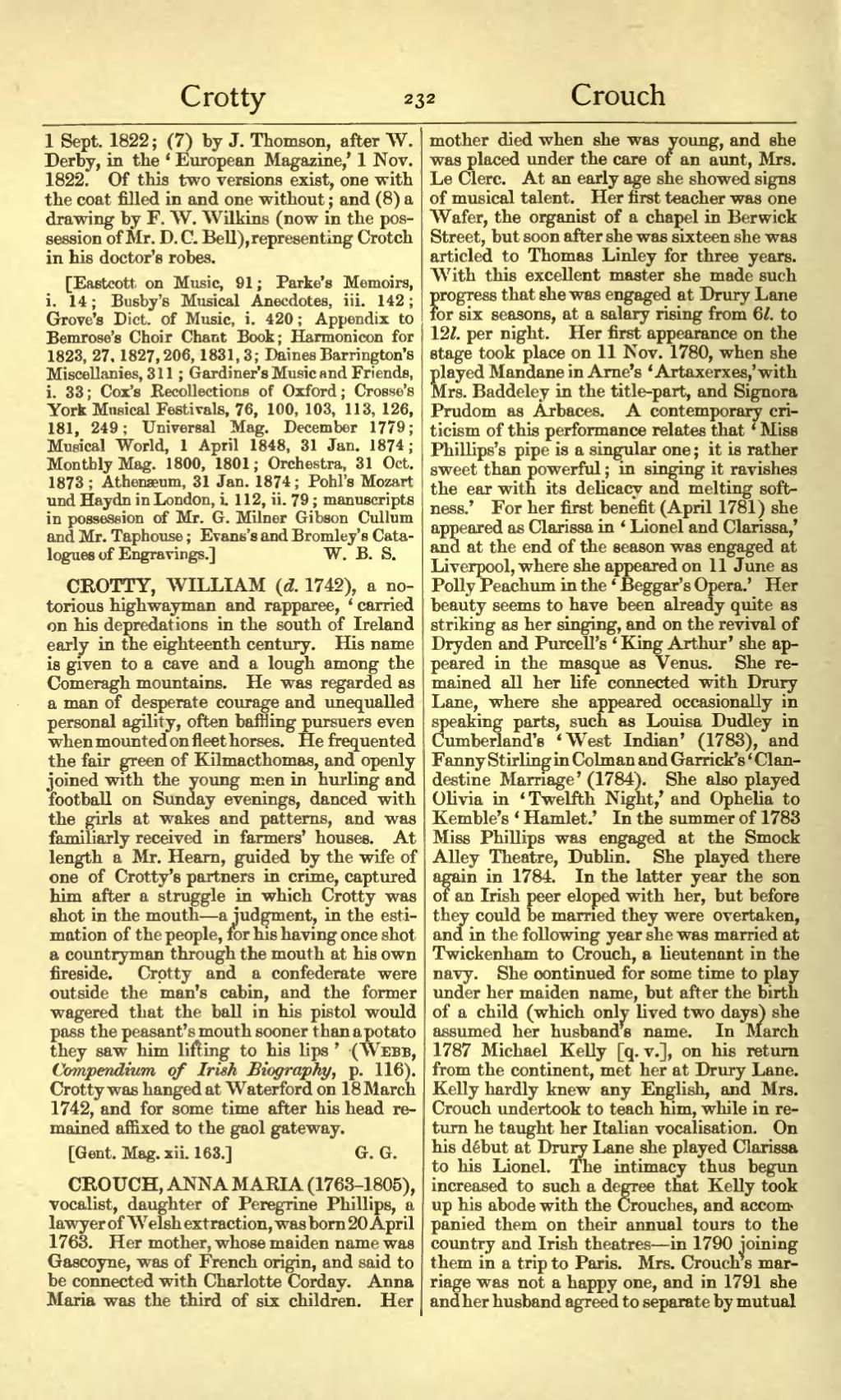1 Sept. 1822; (7) by J. Thomson, after W. Derby, in the ‘European Magazine,’ 1 Nov. 1822. Of this two versions exist, one with the coat filled in and one without; and (8) a drawing by F. W. Wilkins (now in the possession of Mr. D. C. Bell), representing Crotch in his doctor's robes.
[Eastcott on Music, 91; Parke's Memoirs, i. 14; Busby's Musical Anecdotes, iii. 142; Grove's Dict. of Music, i. 420; Appendix to Bemrose's Choir Chant Book; Harmonicon for 1823, 27, 1827, 206, 1831, 3; Daines Barrington's Miscellanies, 311; Gardiner's Music and Friends, i. 33; Cox's Recollections of Oxford; Crosse's York Musical Festivals, 76, 100, 103, 113, 126, 181, 249; Universal Mag. December 1779; Musical World, 1 April 1848, 31 Jan. 1874; Monthly Mag. 1800, 1801; Orchestra, 31 Oct. 1873; Athenæum, 31 Jan. 1874; Pohl's Mozart und Haydn in London, i. 112, ii. 79; manuscripts in possession of Mr. G. Milner Gibson Cullum and Mr. Taphouse; Evans's and Bromley's Catalogues of Engravings.]
CROTTY, WILLIAM (d. 1742), a notorious highwayman and rapparee, ‘carried on his depredations in the south of Ireland early in the eighteenth century. His name is given to a cave and a lough among the Comeragh mountains. He was regarded as a man of desperate courage and unequalled personal agility, often baffling pursuers even when mounted on fleet horses. He frequented the fair green of Kilmacthomas, and openly joined with the young men in hurling and football on Sunday evenings, danced with the girls at wakes and patterns, and was familiarly received in farmers' houses. At length a Mr. Hearn, guided by the wife of one of Crotty's partners in crime, captured him after a struggle in which Crotty was shot in the mouth—a judgment, in the estimation of the people, for his having once shot a countryman through the mouth at his own fireside. Crotty and a confederate were outside the man's cabin, and the former wagered that the ball in his pistol would pass the peasant's mouth sooner than a potato they saw him lifting to his lips’ (Webb, Compendium of Irish Biography, p. 116). Crotty was hanged at Waterford on 18 March 1742, and for some time after his head remained affixed to the gaol gateway.
[Gent. Mag. xii. 163.]
CROUCH, ANNA MARIA (1763–1805), vocalist, daughter of Peregrine Phillips, a lawyer of Welsh extraction, was born 20 April 1763. Her mother, whose maiden name was Gascoyne, was of French origin, and said to be connected with Charlotte Corday. Anna Maria was the third of six children. Her mother died when she was young, and she was placed under the care of an aunt, Mrs. Le Clerc. At an early age she showed signs of musical talent. Her first teacher was one Wafer, the organist of a chapel in Berwick Street, but soon after she was sixteen she was articled to Thomas Linley for three years. With this excellent master she made such progress that she was engaged at Drury Lane for six seasons, at a salary rising from 6l. to 12l. per night. Her first appearance on the stage took place on 11 Nov. 1780, when she played Mandane in Arne's ‘Artaxerxes,’ with Mrs. Baddeley in the title-part, and Signora Prudom as Arbaces. A contemporary criticism of this performance relates that ‘Miss Phillips's pipe is a singular one; it is rather sweet than powerful; in singing it ravishes the ear with its delicacy and melting softness.’ For her first benefit (April 1781) she appeared as Clarissa in ‘Lionel and Clarissa,’ and at the end of the season was engaged at Liverpool, where she appeared on 11 June as Polly Peachum in the ‘Beggar's Opera.’ Her beauty seems to have been already quite as striking as her singing, and on the revival of Dryden and Purcell's ‘King Arthur’ she appeared in the masque as Venus. She remained all her life connected with Drury Lane, where she appeared occasionally in speaking parts, such as Louisa Dudley in Cumberland's ‘West Indian’ (1783), and Fanny Stirling in Colman and Garrick's ‘Clandestine Marriage’ (1784). She also played Olivia in ‘Twelfth Night,’ and Ophelia to Kemble's ‘Hamlet.’ In the summer of 1783 Miss Phillips was engaged at the Smock Alley Theatre, Dublin. She played there again in 1784. In the latter year the son of an Irish peer eloped with her, but before they could be married they were overtaken, and in the following year she was married at Twickenham to Crouch, a lieutenant in the navy. She continued for some time to play under her maiden name, but after the birth of a child (which only lived two days) she assumed her husband's name. In March 1787 Michael Kelly [q. v.], on his return from the continent, met her at Drury Lane. Kelly hardly knew any English, and Mrs. Crouch undertook to teach him, while in return he taught her Italian vocalisation. On his début at Drury Lane she played Clarissa to his Lionel. The intimacy thus begun increased to such a degree that Kelly took up his abode with the Crouches, and accompanied them on their annual tours to the country and Irish theatres—in 1790 joining them in a trip to Paris. Mrs. Crouch's marriage was not a happy one, and in 1791 she and her husband agreed to separate by mutual
